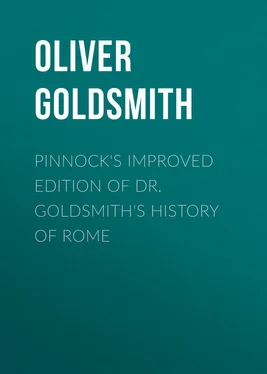Oliver Goldsmith - Pinnock's improved edition of Dr. Goldsmith's History of Rome
Здесь есть возможность читать онлайн «Oliver Goldsmith - Pinnock's improved edition of Dr. Goldsmith's History of Rome» — ознакомительный отрывок электронной книги совершенно бесплатно, а после прочтения отрывка купить полную версию. В некоторых случаях можно слушать аудио, скачать через торрент в формате fb2 и присутствует краткое содержание. Издательство: Иностранный паблик, Жанр: foreign_antique, foreign_prose, на английском языке. Описание произведения, (предисловие) а так же отзывы посетителей доступны на портале библиотеки ЛибКат.
- Название:Pinnock's improved edition of Dr. Goldsmith's History of Rome
- Автор:
- Издательство:Иностранный паблик
- Жанр:
- Год:неизвестен
- ISBN:нет данных
- Рейтинг книги:4 / 5. Голосов: 1
-
Избранное:Добавить в избранное
- Отзывы:
-
Ваша оценка:
- 80
- 1
- 2
- 3
- 4
- 5
Pinnock's improved edition of Dr. Goldsmith's History of Rome: краткое содержание, описание и аннотация
Предлагаем к чтению аннотацию, описание, краткое содержание или предисловие (зависит от того, что написал сам автор книги «Pinnock's improved edition of Dr. Goldsmith's History of Rome»). Если вы не нашли необходимую информацию о книге — напишите в комментариях, мы постараемся отыскать её.
Pinnock's improved edition of Dr. Goldsmith's History of Rome — читать онлайн ознакомительный отрывок
Ниже представлен текст книги, разбитый по страницам. Система сохранения места последней прочитанной страницы, позволяет с удобством читать онлайн бесплатно книгу «Pinnock's improved edition of Dr. Goldsmith's History of Rome», без необходимости каждый раз заново искать на чём Вы остановились. Поставьте закладку, и сможете в любой момент перейти на страницу, на которой закончили чтение.
Интервал:
Закладка:
9. The entire constitution was remodelled by Ser'vius Tul'lius, and a more liberal form of government introduced. His first and greatest achievement was the formation of the plebeians into an organized order of the state, invested with political rights. He divided them into four cities and twenty-six rustic tribes, and thus made the number of tribes the same as that of the curiæ. This was strictly a geographical division, analagous to our parishes, and had no connection with families, like that of the Jewish tribes.
10. Still more remarkable was the institution of the census, and the distribution of the people into classes and centuries proportionate to their wealth. The census was a periodical valuation of all the property possessed by the citizens, and an enumeration of all the subjects of the state: there were five classes, ranged according to the estimated value of their possessions, and the taxes they consequently paid. The first class contained eighty centuries out of the hundred and seventy; the sixth class, in which those were included who were too poor to be taxed, counted but for one. We shall, hereafter have occasion to see that this arrangement was also used for military purposes; it is only necessary to say here, that the sixth class were deprived of the use of arms, and exempt from serving in war.
11. The people voted in the comitia centuriata by centuries; that is, the vote of each century was taken separately and counted only as one. By this arrangement a just influence was secured to property; and the clients of the patricians in the sixth class prevented from out-numbering the free citizens.
12. Ser'vius Tul'lius undoubtedly intended that the comitia centuriata should form the third estate of the realm, and during his reign they probably held that rank; but when, by an aristocratic insurrection he was slain in the senate-house, the power conceded to the people was again usurped by the patricians, and the comitio centuriata did not recover the right 33 33 Perhaps it would be more accurate to say the exclusive right of legislation; for it appears that the comitia centuriata were sometimes summoned to give their sanction to laws which had been previously enacted by the curiæ. See Chap. XII. The Romans were previously acquainted with that great principle of justice, the right of trial by a person's peers. In the earliest ages the patricians had a right of appeal to the curiæ; the Valerian laws extended the same right to the plebeians. The senators were called conscript fathers, (patres conscripti,) either from their being enrolled on the censor's list, or more probably from the addition made to their numbers after the expulsion of the kings, in order to supply the places of those who had been murdered by Tarquin. The new senators were at first called conscript, and in the process of time the name was extended to the entire body.
of legislation before the laws 34 34 See Chap. XII. The Romans were previously acquainted with that great principle of justice, the right of trial by a person's peers. In the earliest ages the patricians had a right of appeal to the curiæ; the Valerian laws extended the same right to the plebeians. The senators were called conscript fathers, (patres conscripti,) either from their being enrolled on the censor's list, or more probably from the addition made to their numbers after the expulsion of the kings, in order to supply the places of those who had been murdered by Tarquin. The new senators were at first called conscript, and in the process of time the name was extended to the entire body.
of the twelve tables were established.
13. The law which made the debtor a slave to his creditor was repealed by Ser'vius, and re-enacted by his successor; the patricians preserved this abominable custom during several ages, and did not resign it until the state had been brought to the very brink of ruin.
14. During the reign of Ser'vius, Rome was placed at the head of the Latin confederacy, and acknowledged to be the metropolitan city. It was deprived of this supremacy after the war with Porsen'na, but soon recovered its former greatness.
15. The equestrian rank was an order in the Roman state from the very beginning. It was at first confined to the nobility, and none but the patricians had the privilege of serving on horseback. But in the later ages, it became a political dignity, and persons were raised to the equestrian rank by the amount of their possessions.
16. The next great change took place after the expulsion of the kings; annual magistrates, called consuls, were elected in the comitia centuriata, but none but patricians could hold this office. 17. The liberties of the people were soon after extended and secured by certain laws, traditionally attributed to Vale'rius Public'ola, of which the most important was that which allowed 35 35 The Romans were previously acquainted with that great principle of justice, the right of trial by a person's peers. In the earliest ages the patricians had a right of appeal to the curiæ; the Valerian laws extended the same right to the plebeians. The senators were called conscript fathers, (patres conscripti,) either from their being enrolled on the censor's list, or more probably from the addition made to their numbers after the expulsion of the kings, in order to supply the places of those who had been murdered by Tarquin. The new senators were at first called conscript, and in the process of time the name was extended to the entire body.
an appeal to a general assembly of the people from the sentence of a magistrate. 18. To deprive the plebeians of this privilege was the darling object of the patricians, and it was for this purpose alone that they instituted the dictatorship. From the sentence of this magistrate there was no appeal to the tribes or centuries, but the patricians kept their own privilege of being tried before the tribunal of the curiæ. 19. The power of the state was now usurped by a factious oligarchy, whose oppressions were more grievous than those of the worst tyrant; they at last became so intolerable, that the commonalty had recourse to arms, and fortified that part of the city which was exclusively inhabited by the plebeians, while others formed a camp on the Sacred Mount at some distance from Rome. A tumult of this kind was called a secession; it threatened to terminate in a civil war, which would have been both long and doubtful; for the patricians and their clients were probably as numerous as the people. A reconciliation was effected, and the plebeians placed under the protection of magistrates chosen from their own body, called tribunes of the people.
20. The plebeians, having now authorised leaders, began to struggle for an equalization of rights, and the patricians resisted them with the most determined energy. In this protracted contest the popular cause prevailed, though the patricians made use of the most violent means to secure their usurped powers. The first triumph obtained by the people was the right to summon patricians before the comitia tributa, or assemblies of people in tribes; soon after they obtained the privilege of electing their tribunes at these comitia, instead of the centuria'ta; and finally, after a fierce opposition, the patricians were forced to consent that the state should be governed by a written code.
21. The laws of the twelve tables did not alter the legal relations between the citizens; the struggle was renewed with greater violence than ever after the expulsion of the decem'viri, but finally terminated in the complete triumph of the people. The Roman constitution became essentially democratical; the offices of the state were open to all the citizens; and although the difference between the patrician and plebeian families still subsisted, they soon ceased of themselves to be political parties. From the time that equal rights were granted to all the citizens, Rome advanced rapidly in wealth and power; the subjugation of Italy was effected within the succeeding century, and that was soon followed by foreign conquests.
Читать дальшеИнтервал:
Закладка:
Похожие книги на «Pinnock's improved edition of Dr. Goldsmith's History of Rome»
Представляем Вашему вниманию похожие книги на «Pinnock's improved edition of Dr. Goldsmith's History of Rome» списком для выбора. Мы отобрали схожую по названию и смыслу литературу в надежде предоставить читателям больше вариантов отыскать новые, интересные, ещё непрочитанные произведения.
Обсуждение, отзывы о книге «Pinnock's improved edition of Dr. Goldsmith's History of Rome» и просто собственные мнения читателей. Оставьте ваши комментарии, напишите, что Вы думаете о произведении, его смысле или главных героях. Укажите что конкретно понравилось, а что нет, и почему Вы так считаете.











